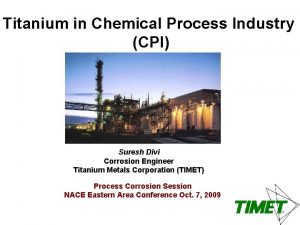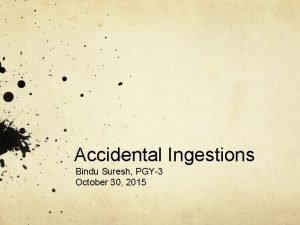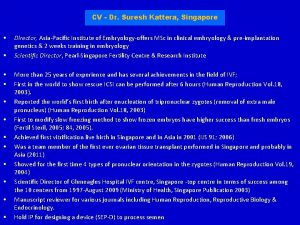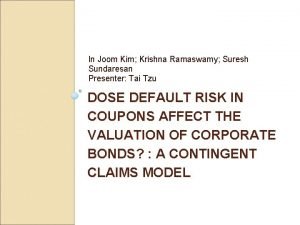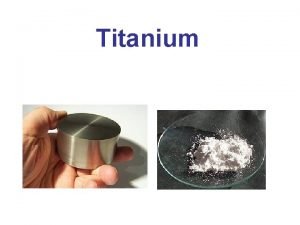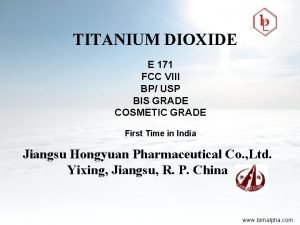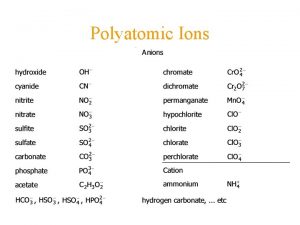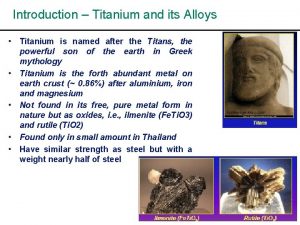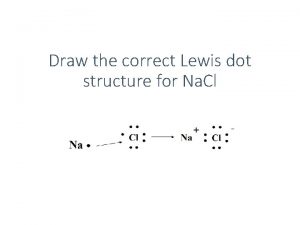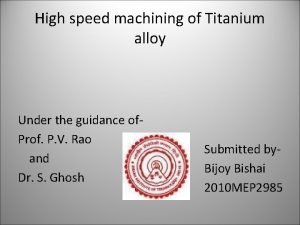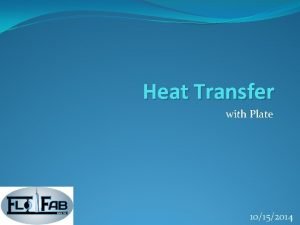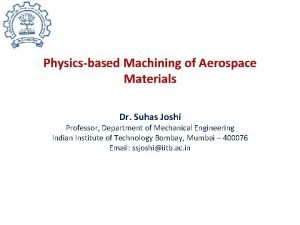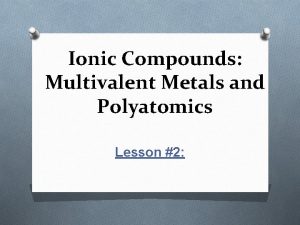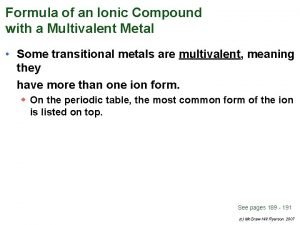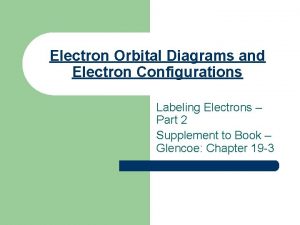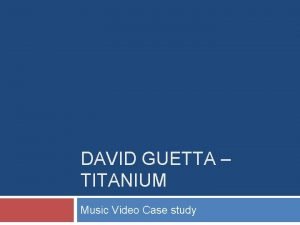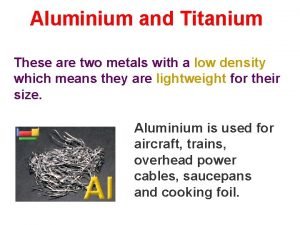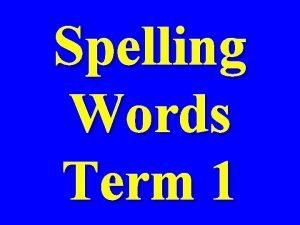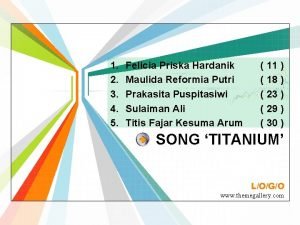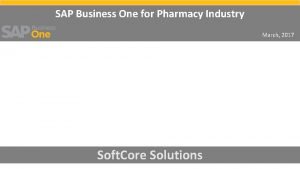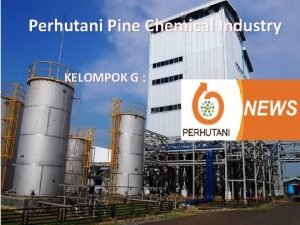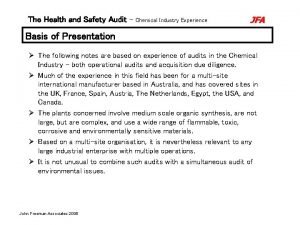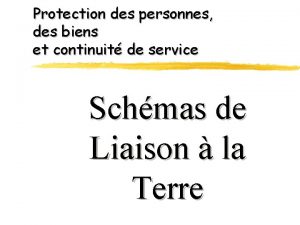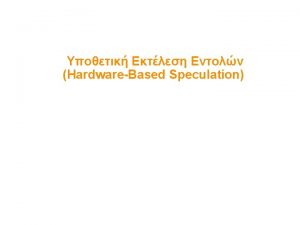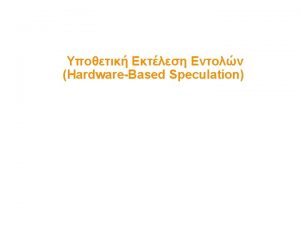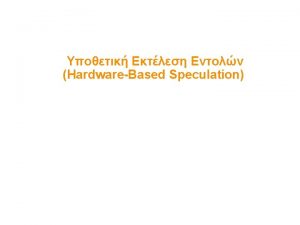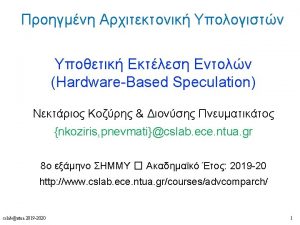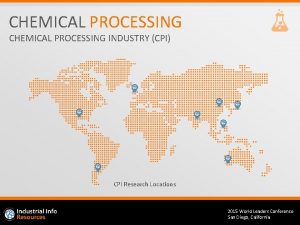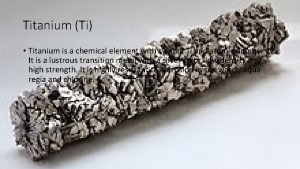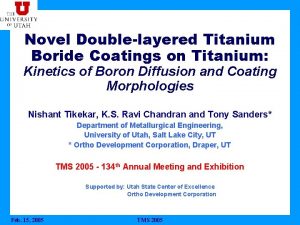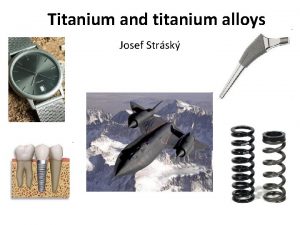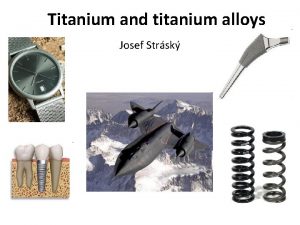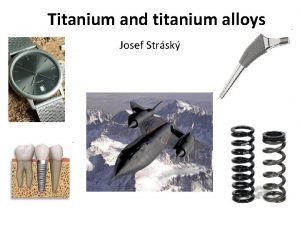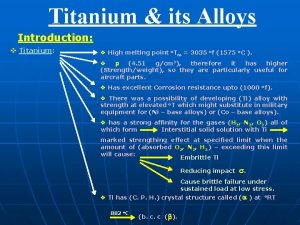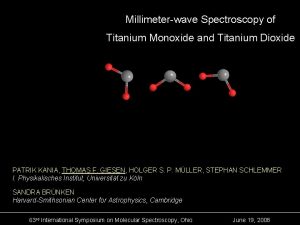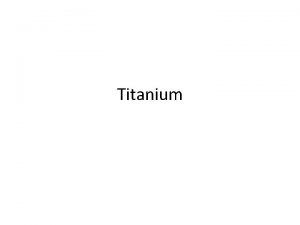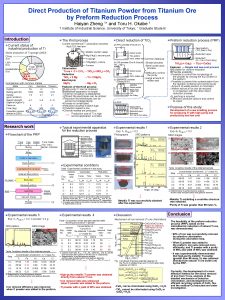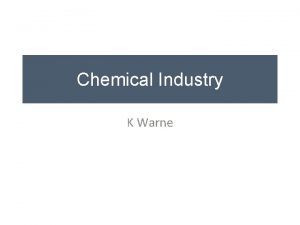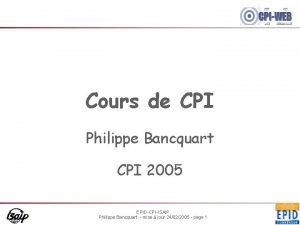Titanium in Chemical Process Industry CPI Suresh Divi


































- Slides: 34

Titanium in Chemical Process Industry (CPI) Suresh Divi Corrosion Engineer Titanium Metals Corporation (TIMET) Process Corrosion Session NACE Eastern Area Conference Oct. 7, 2009

Outline • Introduction to the “CPI” • CPI Equipment/Components • Titanium Corrosion Resistance • Titanium alloys • Ti Applications in CPI • Benefits & Cost considerations • Ti role in the CPI • Summary

Introduction to the “CPI” • An industry in which the raw materials undergo chemical conversion during their processing into finished products • Chemical conversion influences the p. H of the product • Intern p. H influences the corrosion resistance of the metal • Very aggressive conditions (low p. H, high temperature) • In Petroleum refining, acidic conditions arise from chloride salts entering the refinery in crude oil • Dilute HCl acid encounter in many chlorination type chemical process. Example: Manufacturing of Vinyl chloride monomer(VCM)

Typical CPI • Power Generation • Petrochemical • Organic acid • Chemical • Fertilizers • Metal Recovery • Salt • Chlorine • Pulp & paper

CPI Equipment • Heat Exchangers • Reactor vessels • Piping • Pumps • Mixers • Anode baskets • Distillation Columns

Titanium • • • Abundant - Not Exotic! 4 th most plentiful metal on earth Classified as a reactive metal (passive oxide film) About half as dense as nickel Similar in strength to 316 S. S. (CP Ti) Excellent corrosion resistance/immunity in chlorides (especially sea water) • 45+ years service experience with the CPI

Ti Corrosion Resistance • Corrosion protection is due to the formation of oxide film • Thin (100Å) and transparent • Stable and chemically resistant • Smooth and ceramic like, hard to remove • Instantaneously reheal after damage (needs traces of water or oxygen)

Titanium Corrosion Resistance • Anodic Protection (external power supply) • Inhibitors (Fe+3, Cu+2, Mo+6, etc. . ) • Alloying with stable elements (Mo, Zr , Cr) • Alloying with noble metals (Pt, Pd, Ru) • Very resistant to oxidizing media (HNO 3)

Titanium Corrosion Resistance Wide range of passivation

Titanium Corrosion Resistance • Excellent resistance to chloride corrosion (pitting) • Immune to soil & atmospheric corrosion • No preferential weld corrosion • Immune to MIC (microbial influenced corrosion)attack • Good resistance to Erosion • No corrosion in Sea water

Titanium alloys Titanium & Titanium Alloys for the CPI Market

Titanium alloys Mechanical Properties High Medium Low

Titanium alloys Low Strength Grades (1, 2, 7, 11, 16, 17) • Grade 2 most readily available • Strength similar to austenitic SS • Pd/Ru does not affect mechanical props Medium Strength Grades (3, 12, 9, 28) • Can be cold formed (strip producible) • Available in all product forms • Strength similar to duplex SS • Highest strength ASME grades High Strength Grades (23, 29, 32, 5) • Common product forms are bar/billet/plate • Must use heat when forming • Weldability is best in grade 32 • Oxygen/Al content affect toughness and SCC

Titanium alloys-Reducing acids

Localized Corrosion 14 - General Guidelines for Crevice Corrosion Resistance of Titanium in Na. Cl Brine Media p. H Grades 1, 2, & 3 7 - Crevice corrosion possible Grade 12 Pd Grades 7 & 16 00 150 Temperature (ºC) • Not susceptible to pitting or SCC attack (unalloyed grades) • All Ti grades resistant to crevice attack to about 80°C • Other grades (especially Pd) can be used up to >250°C 300

Corrosion - Galvanic Effects • Ti very noble in chlorides - almost always the cathode • Since Ti is cathode, no concern for corrosion • In galvanic couple, other metal may have accelerated corrosion attack • Hydrogen damage to Ti may occur if cathodic potential not regulated and if temperature > 80ºC

CPI companies use Ti • Dow, Dupont • Shell, Chevron, BP (AMOCO) • Morton Salt • Kerr-Mc. Gee • Bayer • Heinz • BASF

Ti application in CPI Reactor Vessel Ti lined reactor vessel for mining operation

Ti application in CPI cont. . Tube Exchanger Straight heat tube exchanger

Ti application in CPI cont. . Tube Exchanger Plate coil immersion heat exchanger Plate heat exchanger

Ti application in CPI cont. . Ti tubed salt evaporator for table salt

Ti application in CPI cont. . Ti anode baskets for anodized metal parts

Benefits-Corrosion Resistance (Sea Water) Corrosion Mode Cu Alloys Al Alloys 316 SS Adv. SS Ni Alloys Titanium General Corrosion R/S R R R Erosion Corrosion S R R R Pitting Attack S S S R R R Crevice Corrosion S S S R Stress Corrosion R/S S R/S R R R MIC S S R R Weld Attack S S R R Galvanic Attack S S S R R R Composite Comp. S S S R S=Susceptible R=Resistance

Benefits-Corrosion Resistance (Performance) Maximum Performance v v v v Minimum Performance v Titanium ASTM Grades 7 & 16 Titanium ASTM Grade 12 Titanium ASTM Grade 2 / Alloy C-276, C 22, 59 Alloy 625 6 Mo Stainless Steel / 2507 Stainless Steel 2205 Stainless Steel 316 L Stainless Steel 304 Stainless Steel

Galvanic series-Sea water

Ti application Sea water application Centrifugal pumps

Ti application Sea water application Cast pump for handling sea water

Benefits-Density • Roughly half as dense as iron & nickel based alloys • A pound of titanium goes a lot further Titanium Zirconium Stainless Steel Nickel Copper

Benefits Good Thermal Conductivity (12. 5 Btu/Hr-Ft 2 -°F/ft) • 30% above 300 series Stainless steel, • 60% above the super stainless grades Low Elastic Modulus (15 Mpsi) • Titanium flexibility considered into design and fabrication (supports, shafts) Life cycle • Ti wins life cycle costing and proper design engineering (thin wall, no corrosion allowance)

Benefits-Design Allowance

Cost considerations Total system installed cost & maintenance • Eliminate multiple installation/replacement costs • Reduced maintenance costs (oxide forms “slick” surface) • Titanium does not require coatings • Environmental/contamination costs (Ti non-toxic) • Reuse/recycle of Titanium

Ti role in the CPI Mature Applications >30 yrs service history

Ti role in the CPI Newer Applications <20 yrs service history

SUMMARY • Excellent chloride corrosion resistance • Wide selection of alloy properties without sacrificing corrosion resistance • Proven resistance to many organic chemicals • Environmentally friendly metal • Cost effective for CPI equipment • >40 years proven service in the CPI
 Cpi chemical process industry
Cpi chemical process industry Attana plant
Attana plant Suresh lodha ucsc
Suresh lodha ucsc Lalith suresh
Lalith suresh Bindu suresh md
Bindu suresh md Gurudeva social studies
Gurudeva social studies Dr suresh kattera
Dr suresh kattera Dr rajendran suresh
Dr rajendran suresh Kattera suresh babu
Kattera suresh babu Dr suresh gupta ganga ram hospital
Dr suresh gupta ganga ram hospital Suresh sundaresan
Suresh sundaresan Www.gurudeva.com new
Www.gurudeva.com new Oltp
Oltp Titanium group elements
Titanium group elements Titanium dioxide usp fcc
Titanium dioxide usp fcc Ate vs ite
Ate vs ite Titanium crystal structure
Titanium crystal structure What is the correct lewis dot structure for arsenic
What is the correct lewis dot structure for arsenic High speed machining titanium
High speed machining titanium Ss heat exchanger
Ss heat exchanger Titanium alloys
Titanium alloys Multivalent ionic compounds examples
Multivalent ionic compounds examples Pictures of a teepee
Pictures of a teepee Examples of multivalent ionic compounds
Examples of multivalent ionic compounds Boron orbital filling diagram
Boron orbital filling diagram David guetta titanium music video
David guetta titanium music video Titanium means
Titanium means Titanium spelling
Titanium spelling Titanium js framework
Titanium js framework Felicia gliksman
Felicia gliksman Sap business one for chemical industry
Sap business one for chemical industry Perhutani pine chemical industry pemalang
Perhutani pine chemical industry pemalang Safety audit in chemical industry
Safety audit in chemical industry Régime it cpi
Régime it cpi Cpi santa lucia moraña
Cpi santa lucia moraña
